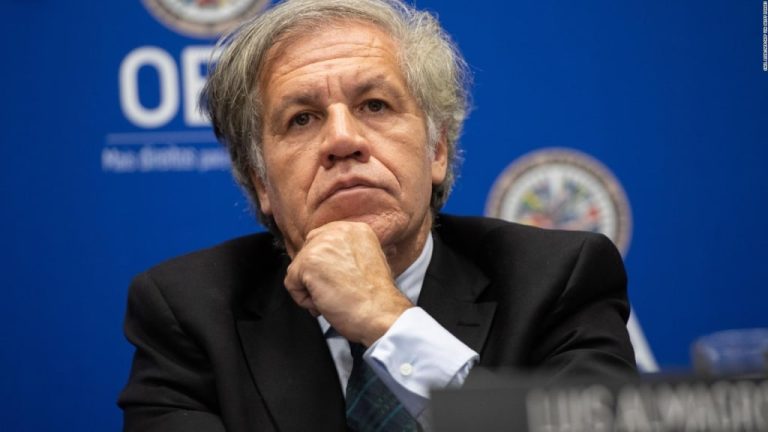10 de noviembre 2021

Children of Exile: The Births “Sowing Hope” in the Camp of Nicaraguan Farmers

PUBLICIDAD 1M
PUBLICIDAD 4D
PUBLICIDAD 5D
Meanwhile, a group of US senators demands the use of all diplomatic and economic tools against the regime in Nicaragua.

On Tuesday, the Secretary General of the Organization of American States (OAS), Luis Almagro, rejected the results of the “illegitimate elections” in Nicaragua that secured a fourth consecutive term for Daniel Ortega, and called for the international community to demand their annulment.
Almagro said that an appeal should also be made for holding a new electoral process with guarantees, observation and real competition, in reference to the procedures that have been nullified by the intensification of government repression in recent months.
A day before the OAS’ meeting of foreign ministers begins on Wednesday, Almagro declared “I urge OAS countries to respond to this clear violation of the Democratic Charter during their assembly,” in which the crisis in Nicaragua , specifically, will be an agenda item.
Almagro accompanied his pronouncement with a detailed report on the pleas and efforts made by the OAS for Nicaragua to return to a democratic path, which were ignored by the Nicaraguan ruler.
Among the main issues pointed out by Almagro are the electoral authority’s lack of independence, the repression as exemplified in the arrest of opposition candidates, the cancellation of the legal status of opposition parties, attacks on civil society and freedom of expression, and above all, the lack of willingness to make electoral reforms, choosing instead to approve an insubstantial process.
“The current Supreme Electoral Council does not enjoy the credibility, independence or autonomy to conduct democratic, fair and transparent elections. The regime maintains its power by increased control over the electoral authority, with an objective that is, clearly, the co-optation of the electoral powers,” Almagro denounced in his report.
The OAS Secretary General said another characteristic of the electoral process of November 7 is that the other parties that were allowed to participate in the elections are “close to the government,” according to analysts, and that this process was carried out without recognized international observation.
With this detailed document, Almagro establishes his position, after at least five former presidents have requested the suspension of the Nicaraguan regime from the organization, given the clear violations committed using repression and the lack of democratic guarantees for a free election.
As of Monday, 36 countries have declared the Nicaraguan elections illegitimate, including the United States, the European Union —made up of 27 nations—, Spain, Chile, Peru, Uruguay, the Dominican Republic, Colombia, and Panama, among others.
The international community has repeatedly demanded the release of political prisoners, a total of 150, 39 of whom have been arrested since last May, during the repressive escalation imposed by the regime to eliminate political competition. Among this last group of detainees, there are seven presidential candidates, and civic and business leaders whom Ortega vilified on Monday when celebrating his “victory” in Managua.
The Sandinista strongman called the political prisoners “Yankee sons of bitches.” The system under his control has charged most of them with the crime of “treason”– without evidence –, while others are accused of crimes such as money laundering, which makes them participants in an alleged conspiracy to overthrow him in 2018.
Evidence from human rights organizations, including the Inter-American Commission on Human Rights, ascribed to the OAS, shows that the opposite is true: the systematic human rights violations that left 328 people dead, thousands injured, and more than 100,000 citizens in exile; crimes for which the State of Nicaragua has not responded, leaving each of these cases in impunity.
While Ortega mocked the victims of his system, reactions continued in the United States after President Joseph Biden’s condemnation and Secretary of State Antony Blinken’s questioning the results of Nicaragua’s elections.
Louisiana Senator Bill Cassidy denounced what he called a mock election in Nicaragua. He spoke on behalf of a bipartisan group of his Senate colleagues: Bob Menendez, Patrick Leahy, Jim Risch, Marco Rubio, Dick Durbin, Ted Cruz, Ben Cardin and Tim Caine.
“We strongly condemn the Ortega-Murillo regime’s fraudulent attempt to maintain power in Nicaragua via the November 7 pseudo elections, after arresting and imprisoning the political opposition and members of civil society. These elections were not free or fair, so the results do not represent the will of the Nicaragua people,” the senators said.
The lawmakers added that most countries in the hemisphere and the world should recognize that the Ortega regime has become a crude dictatorship, and therefore, should back the US employing all the diplomatic and economic tools at its disposal to support the Nicaraguan people.
In recent days, Congress approved the Renacer Law, still pending the signature of the White House, which gives new tools to pressure Ortega, including greater scrutiny of international loans to Nicaragua, the review of its participation in the trade agreement with the United States, Central America and the Dominican Republic (CAFTA-DR) and the possibility of greater sanctions against those who prevented the holding of free elections.
This article was originally published in Spanish in Confidencial and translated by Havana Times
PUBLICIDAD 3M
Periodista nicaragüense, exiliado. Comenzó su carrera en el año 2000, cuando todavía era estudiante. Por sus destacadas investigaciones periodísticas ha ganado el Premio Ortega y Gasset, el Premio Internacional de Periodismo Rey de España, el Premio a la Excelencia de la Sociedad Interamericana de Prensa, y el Premio Latinoamericano de Periodismo de Investigación del Instituto Prensa y Sociedad (IPYS).
PUBLICIDAD 3D